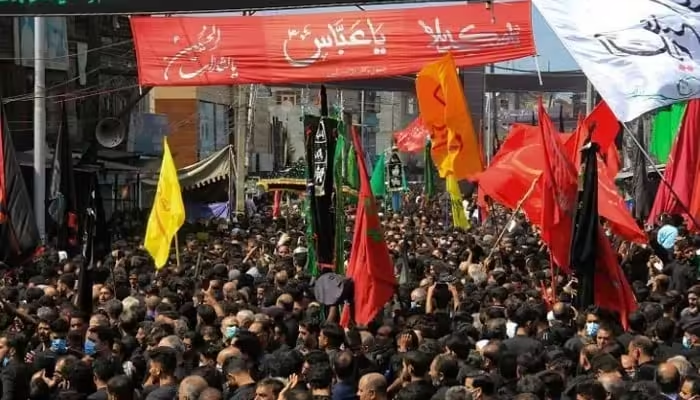The Sindh government announced a series of stringent security measures on Sunday in preparation for the Chehlum of Hazrat Imam Hussain (RA), which took place on Monday. Among the most significant of these measures was the suspension of cellular services in all major cities across the province, including Karachi, Hyderabad, Larkana, Sukkur, and Khairpur. This decision was made to ensure the safety and security of the public during the observance of Chehlum, a day that commemorates the 40th day of mourning for the martyrs of Karbala.
Sindh Home Minister Ziaul Hasan Lanjar confirmed that mobile phone services would be temporarily halted in major urban areas, emphasizing that the step was essential to maintaining law and order. The home minister explained that the suspension of cellular services was part of a broader security plan designed to prevent any potential threats or disruptions during the religious processions and gatherings.
To further bolster security, the provincial government placed security forces on high alert. According to Minister Lanjar, the authorities would be closely monitoring the situation, with special attention given to the large mourning processions expected to take place in various cities. He also mentioned that these processions would be monitored from the air to ensure an additional layer of security and to promptly respond to any incidents.
The Pakistan Telecommunication Authority (PTA) also issued a statement, confirming the suspension of voice and data services in Karachi and other cities within Sindh, including Khairpur, Hyderabad, Larkana, Sukkur, and Shikarpur. The PTA indicated that this action was taken under the directives of the Ministry of Interior as part of the security protocol for the Chehlum.
In addition to suspending cellular services, the Sindh government implemented a ban on pillion riding throughout the province, including in Karachi. This measure, which restricts two people from riding on the same motorcycle, was introduced to minimize the risk of any untoward incidents during the day’s events. The government’s decision to impose this ban is a reflection of the heightened security concerns that typically accompany significant religious observances like the Chehlum.
In the lead-up to the Chehlum, the Sindh government also declared a public holiday for all public and private educational institutions across the province. This move was intended to reduce public movement and allow citizens to participate in the religious observances without the usual daily commutes and activities.
Security measures were not confined to Sindh alone. In Rawalpindi, local authorities also announced a public holiday in the city on the day of Chehlum. The Rawalpindi police released a detailed security plan for the seven major processions expected to take place across the city. According to SSP Operations Hafiz Kamran Asghar, more than 4,400 security personnel and officers were deployed to safeguard the city. These personnel were strategically stationed around key areas and procession routes to ensure the safety of participants and the general public.
In addition to the deployment of security personnel, the Rawalpindi police made arrangements to regulate vehicular traffic in and around the city. Over 200 officers were assigned to manage traffic flow, ensuring that the processions could proceed without unnecessary delays or disruptions.
The combined efforts of the Sindh and Rawalpindi authorities highlight the importance placed on maintaining peace and security during the Chehlum of Hazrat Imam Hussain (RA). The suspension of cellular services, the ban on pillion riding, the aerial monitoring of processions, and the extensive deployment of security forces all reflect the government’s commitment to ensuring that the day’s events proceed without incident.
As the Chehlum concluded, the successful implementation of these measures was a testament to the coordination between various government agencies and the commitment of security forces to protect the public during this significant religious observance. The day served as a reminder of the ongoing need for vigilance and preparedness in the face of potential threats, particularly during times of mass gatherings and religious commemorations.



